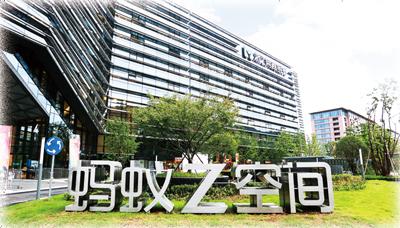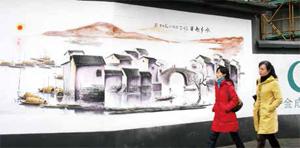漫步西溪路:今日杭州
2019-04-19大卫
大卫
走出我的公寓楼左转,映入眼帘的是一派都市盛景,这种繁华正逐步深入中国各大城市,成为中心地带的常态。宽阔的林荫大道两侧,钢构架配玻璃外墙的大厦林立,间或有几家五星级酒店和银行分行。若有心去寻找,还可以看到两家相距大概两百米的星巴克,赫然昭示着全球化的进程。看到这些,你大可不必惊讶。繁荣的城市大都如此,况且中国作为世界第二大经济体,欣欣向荣的地方多着呢。当然,即便繁花似锦也各有姿态,这些欣欣向荣之地也是如此,在我看来很应该花些时间细细研究一番。不过中国值得研究的可不仅仅是这些宽阔的林荫大道。若出公寓楼右转,呈现在眼前的则是完全不同的景象,这里离之前全球化惠及之地不过两分钟的路程,简直令人难以置信。这片截然不同的街区正在迅速消失,可以预见,不久以后我每天看到的街景和我住的公寓楼都会被推土机夷为平地。所以,在这片即将消失的街区来一场小“探险”,徜徉在窄街小巷中,也不失为一种有趣的体验。

西溪路上店铺繁多,每家店通常就一个店主,在波纹铁门内的低层小单间里做着小生意,而店面大多局促隐蔽。为了给我在2018年春天的所见之物编排目录,我将据其环境氛围逐个列出:
一大早,小卡车停靠在路边,货架上放得满满当当的,老板坐在一旁的矮凳上等待着生意。如果有人前来光顾的话,定能给摊子带来人气;如果遇上了本地买主,人们就更有兴趣在店里闲话起来。这种生产销售有时与西方国家的不大一样,不知怎的,我觉得竹笋更有吸引力——令我想起了一小片树林,树的根部伸展到土地深处。大概是竹笋总放在货架底层的缘故吧,毕竟那儿离地最近。
与生产销售的小摊不尽相同,他们兜售某种“毛”河虾。鱼虾在塑料盆儿里游来游去,老板们都是卖活的。肉类也都直接卖,不放冰箱,也不放在玻璃柜里。如果还没完全切割好的话,就直接把肉摆在顾客面前,或者用钩子挂着。其中也包括牲畜的脏器,比如:肺。在城市中国的各个地方,集贸市场的肉类售卖方式大多如此。但是,更多的杂货铺不这样卖。而且,杂货铺的数量逐年增多。
修理的业务范围包括摩托车和电动摩托车、自行车、家用电器及电子、管道设备、五金杂件和家庭钟表。钟表店还销售新产品,所以它只是部分属于此类。实际上,除了钟表店,其他所有修理店都不大能容得了身,店里的空间都被一摞摞东西占满了。我发觉,尽管我每次出门回家都能见到它们,但当我提笔写作时,却无法形成清晰的画面,它们任性地在我脑海里跳来跳去,不知道哪儿是哪。当然,这不包括时钟店。老板执拗地在墙上挂满了走动的时钟,彼此的间隔时间固定。似乎提醒着我们,一切都在嘀嘀嗒嗒地流逝。

中國小餐馆特别多,西溪路也不例外。西溪路上有几家面馆,除了餐具等不大一样外,他们提供的面食与购物商场里的并无二致,只不过后者的门店更新、环境更好罢了。可是,在此用餐的确给人与众不同的体验,店主们也不轻易到别的地方去。但应该说,对于中国社会这个特殊阶层,他们有发挥个人主动性的一定空间。这儿有好些私人广告牌,或者摊贩们骑着电瓶车或摩托车当街叫卖,有的人拉载的货多、有的货少。我看到过一块有红色手写字体的牌子,写的人似是漫不经心、不刻意讲究。牌子上的商品目录倒是十分丰富。我能清楚地辨认出“烟”、“酒”这类常用字,其下跟着一长串医药保健商品名称,其中有一个我完全不懂。我问我的学生,他们告诉我,它叫冬虫夏草,是传统中医药材,我还以为是某种蘑菇呢。在明清两代的街景照片和绘画中,我们可以了解到中国早在很久以前就使用广告标语了。我眼前的自制广告牌已又是新一代的版本了。我很好奇,将来城市中国把这些拥挤的区域清理之后,它会以什么样的新形式出现呢?
洗衣服确实是人们生活中的很重要的一方面。可以想见,在人口稠密的西溪路晾干衣服听起来是多么稀奇。人们充分利用可用的街道晾晒,没有人会去移动甚至是注意到它。在中国大学校园,在阳光明媚的周末或是相当于春天大扫除的温暖日子里,这样的风景也随处可见。在公共区域,或院子里,大家把刚洗过的毯子盖在灌木丛上。没人会拿走,要不是初到中国的美国朋友指着让我看,我早就不觉得奇怪了。直到那个时候,我才突然发现,原来我已经习惯了头上挂着随风飘动的衣服,习惯了西溪路的一草一木。如果这些都不复存在,我会很怀念和留恋啊。
(节选自《来自中国的明信片:大运河纪行》,本文题目为编者所加。)
Xixi Lu:A Walk through Hangzhou
Excerpts from Chapter four ofPostcards from China: Travels along the Grand Canal
By David Pickus
If you walk out of my apartment building and turn left, you can easily see a cityscape that is becoming the norm in the prosperous parts of all of Chinas large cities. It is a wide boulevard of steel and glass buildings, with five-star hotels, several bank branches, and in case anyone wants an obvious symbol of globalization, there are two Starbucks within about two hundred meters of each other. The point is not really to gape in wonder. Much of the affluent world looks like this and China, with the worlds second largest economy, contains a great many affluent parts. Naturally, those affluent parts have their own special character and qualities, and time should be taken to examine them carefully. But of course China is not only these wide boulevards. Thus, if you walk out of my apartment building and turn right you see a quite different world, even though it is only a two-minute walk from the globalized one. This different world is one that is fast disappearing and my prediction is that the street scene I see daily, as well as the very building I live in will be bulldozed in the very near future. Hence, it helps to take a small trip down such a fast-disappearing street, as well as into its alleyways and side streets.
The businesses along Xixi Lu are many, but they are “hole in the wall” businesses, typically operated by a single proprietor in which a corrugated iron door opens into a single room in a low single-story building. Just for the sake of cataloging what can be seen in the spring of 2018, I will list something of their atmosphere:
. I agree that there is nothing especially exotic about such things, but the older way of selling produce is becoming less and less common. They are not always little stores you can walk into, but more like a closet with shelves that is locked up with a metal door at night. Early in the morning a small truck pulls up and the shelves are fi and then the proprietor sits near it on a low stool and you shop creates a certain amount of bustle and makes it impossible to walk by quickly, which, if you are a local, creates even more of a temptation to stop and gossip, etc. The produce sold is not always the same as that which is sold in Western countries, and for
some reason I have always found the bamboo shoots attractive. They are called 筍 (sun) and this character, to me, seems to evoke some small grove of trees with a root extending into the ground. Maybe this is because they are always put in the bottom shelf, closest to the ground.
. These are not entirely different from the produce stalls, as those stalls also sell a kind of “hairy” river shrimp. Both the shrimp and fish are sold live, swimming around in plastic tubs. The meat is also sold with some directness without being put in a refrigerator or behind glass. It is simply put out in front of you or hung on a hook if the carcass has not been fully carved. This also includes buckets of organs like lungs. Across urban China, there are many open markets that sell meat like this. But there are also even more grocery stores that do not sell meat this way. And every year the grocery stores are getting more numerous.
. These include repairs for scooters and electric motorbikes, bicycles, household appliances and electronics, plumbing and miscellaneous hardware, and household repair and watches and clocks. Most of these stores are large enough to walk inside, only they tend to be very cluttered. In fact, except for the watch and clock store—which only partly belongs in this category, since it also sells new goods— all of them are rather difficult to walk into, since space is occupied by heaped up piles of things. I realize now, in writing about it, that even though I live close enough to see them clearly every time I leave or enter my home that I cannot form a clear picture of what objects are where. They seem to jump around in my mind. Except, of course, for the time-keeping store, which in my view somewhat sternly filled a whole wall with running clocks of every sort hung at regular intervals. As if to remind us that all this is ticking by.
. China has a great many small restaurants and Xixi Lu is no exception. There are several noodle shops and while the utensils, etc., are different, the noodles honestly are not so different from those served in the newer and fancier places and in the shopping malls. Yet, it feels different to eat them here, and the proprietors do not easily have another place to go. It should be said that in this particular stratum of Chinese society there is some scope for individual initiative. There are any number of privately done advertisements, or people coming by on electric carts and motorbikes selling any number of things. Indeed, there is one red-lettered, casually hand-painted sign that offers good deals on a wide range of items. Among them, I can clearly recognize the common characters for tobacco (煙) and liquor (酒), followed by a series of medicines and health products, including one I could not understand at all. I asked my students who told me it translates as “Chinese caterpillar fungus.” I thought this was a kind of mushroom, but they said it was an herb used in traditional medicine. Photographs and paintings of street scenes in the Qing and even Ming dynasties show how long- established the practice is of using advertising placards in China. The homemade sign in front of me is another iteration of a long practice. I wonder what form it will take when urban China sheds these cluttered areas entirely.
. I understand that this is not a business, but washing our clothes is a principal human business and it should be expected that in high-density Xixi Lu space for drying clothes will be scarce and that people use available venues without anyone else moving it, or even much noticing it. Thus, it is a normal sight on a Chinese university campus during a warm weekend, or the equivalent of a spring cleaning time, to see a recently-washed blanket draped over a bush in a public place like a quad. No one takes it away, and it was only when an American friend who was new to China drew it to my attention that I realized I had stopped noticing it. Likewise, it was only when I began to think of how I came to get used to the clothing fluttering above me that I realized that I had grown used to Xixi Lu and missed it when it was gone.
